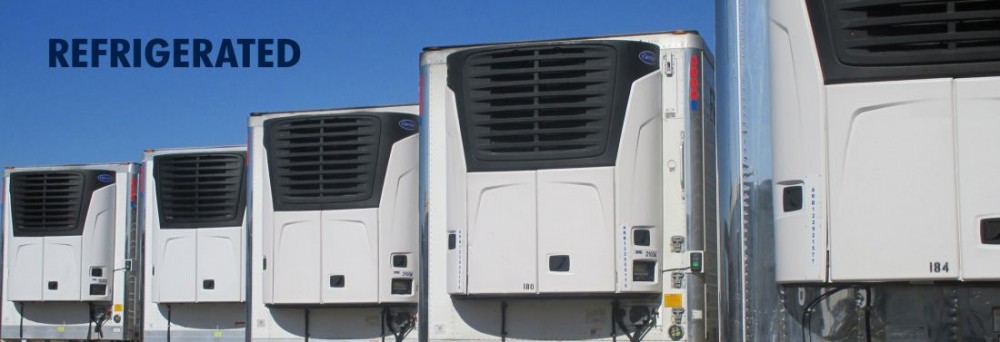Refrigerated trucking services help ensure the freshness and safety of foods that can travel as near as across town to as far as across the country (and sometimes even in from another country). They play a vital role in getting fresh produce and foods to people all around the world, but they also have another important role: transporting medication and similar perishables.
If you’re just now learning about refrigerated trucking, you might not know that trailers are called reefers. If you’re an experienced driver, you understand temperature standards ranging from banana to deep frozen. No one’s invented a refrigerated trucking trivia game yet, but when they do, these facts belong in the cards.
Cold Facts | Refrigerated Trucking Services
Without refrigerated trucks, grocery stores, restaurants, and households alike would see a huge decrease in the number of food options they have.
What Refrigerated Trucks Are Used For?
Inbound Logistics described in their recent piece on refrigeration trucks that their purpose stretches far beyond food. Every day, refrigeration trucks are put in charge of hauling:
- Pharmaceuticals at temperatures between 30 degrees and 45 degrees Fahrenheit in order to remain safe and effective.
- Fine art and antiques that have to be kept in a stable climate of around 70 degrees Fahrenheit to preserve them properly and prevent damage that results from harsh humidity or temperature changes.
- Personal care products, such as perfumes and cosmetics, which can be damaged or ruined if exposed to the vast fluctuating climate of the surrounding environment during transport.
- Chemicals and engineered materials that could also be damaged or ruined if exposed to the exterior climate.
It pays more than traditional trucking
Part of the reason for this is that the cost of fuel for a refrigerated truck is higher because the refrigeration unit consumes energy. Thankfully this means that shippers pay more to move freight on a reefer. New advances such as solar panels to reduce energy costs and increased fuel efficiency are making truck operation more affordable; so profit margins are rising.
Rugged Reefer Specs
Refrigerated trailers are designed to run even without tractors. They’re built with independent fuel supplies, motors and refrigerating equipment. Small insulated reefers average 28 feet in length while big trailers stretch out to 53 feet. Average width measures 8 feet, interior heights average 13 feet, and interior space can cover more than 3,500 cubit feet. The heaviest haulers run on four axles and 16 wheels.
Lipstick, Perfume and Penguins
Fresh produce and frozen goods aren’t the only types of cargo that depend on refrigerated transportation. Pharmaceuticals and flowers are also on the list along with artwork, antiques and cosmetics. Reefers transport penguins, perfume and even honey bees across the country in climate-controlled interiors with temperatures ranging from 55 to minus 20 degrees Fahrenheit.
Phenomenal Growth Percentages
Nothing slows down refrigerated trucking, and today’s rigs haul more than 70 percent of our country’s food supply. Add the expanding need for specialized transportation in medical, industrial and electronic fields, and the forecast for success becomes even brighter. The industry will grow by 12 percent annually through 2019 as it heads up the highway to an ever-expanding future.
Not seasonally dependent
If you haul grain or livestock, you probably spend a good portion of the year waiting around. Not so with refrigerated trucking. While there are always slight seasonal upticks, for example around the holidays, reefer loads don’t have the high highs and low lows of some other types of trucking; making it a more attractive option for owner operators or company drivers who want to stay busy on the road.
More Info
- Refrigerated transport got its start in 1842 on railroad cars that were used to haul items during cold weather. Later, ice was added to the train cars. The first iced trucks started rolling in the early 1910’s.
- Before methods of keeping products cold were dreamed up, produce could only travel about 50 miles from the farm where it was grown. Cows were sent live to slaughterhouses since their meat could not be shipped, but often died or lost significant amounts of weight in transport.
- Mechanical refrigeration units for trucks were first manufactured by the U.S. Thermo Control Company in the 1940’s.
Cannonball Express Transportation
Since 1970, Cannonball Express Shipping Company has been providing top-of-the-line service at a reasonable rate. Based in Omaha, Nebraska, we provide nationwide refrigerated LTL services, as well as, local delivery services.
Nationwide Shipping Company Services:
- Refrigerated LTL deliveries in the lower 48 states
- Refrigerated Cross dock
Local Shipping Company Services:
- Redelivery Services
- Truckload & LTL Capabilities
- PUP
- Cross dock
- Transload
- Warehouse and Distribution capabilities from multiple Omaha Locations

